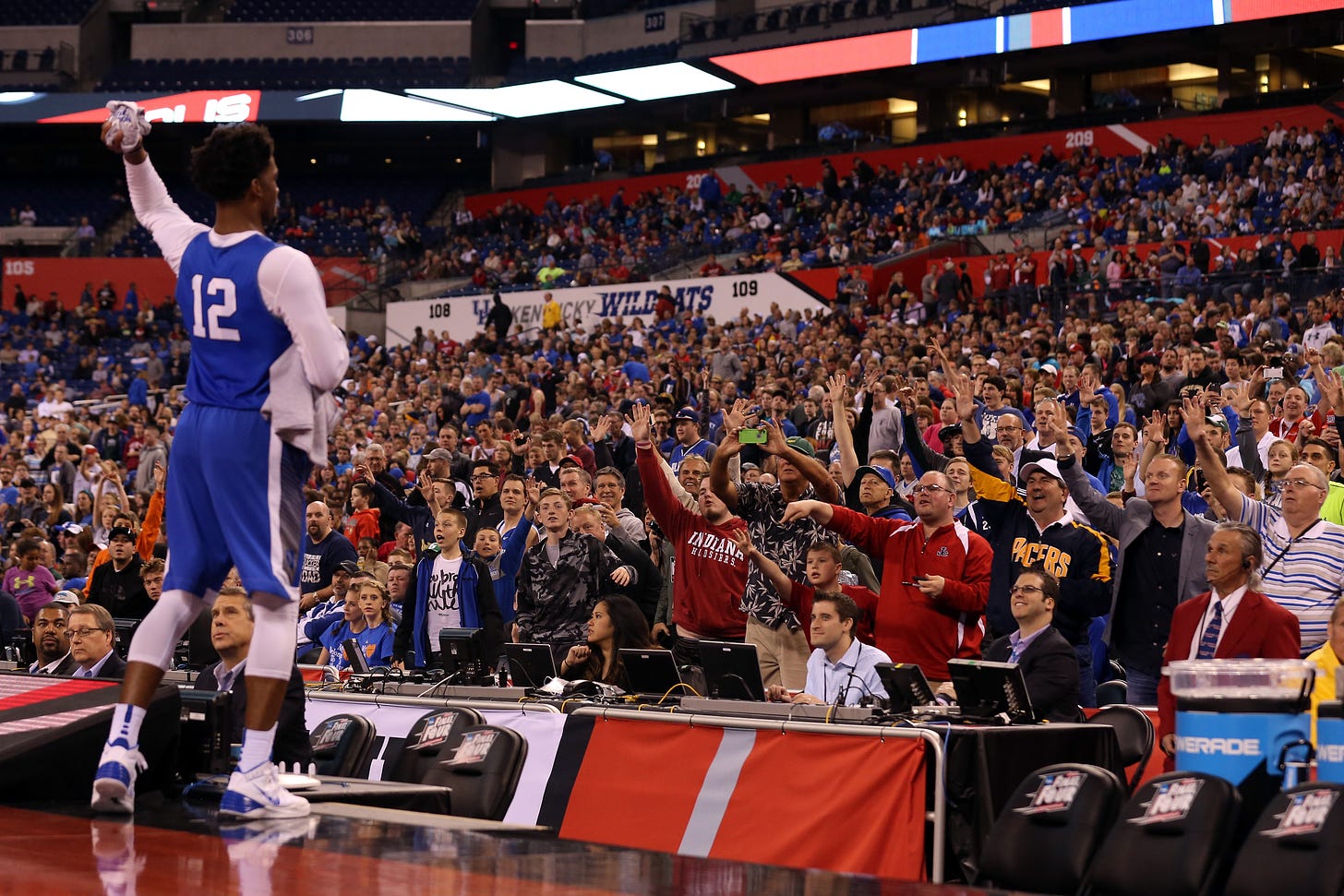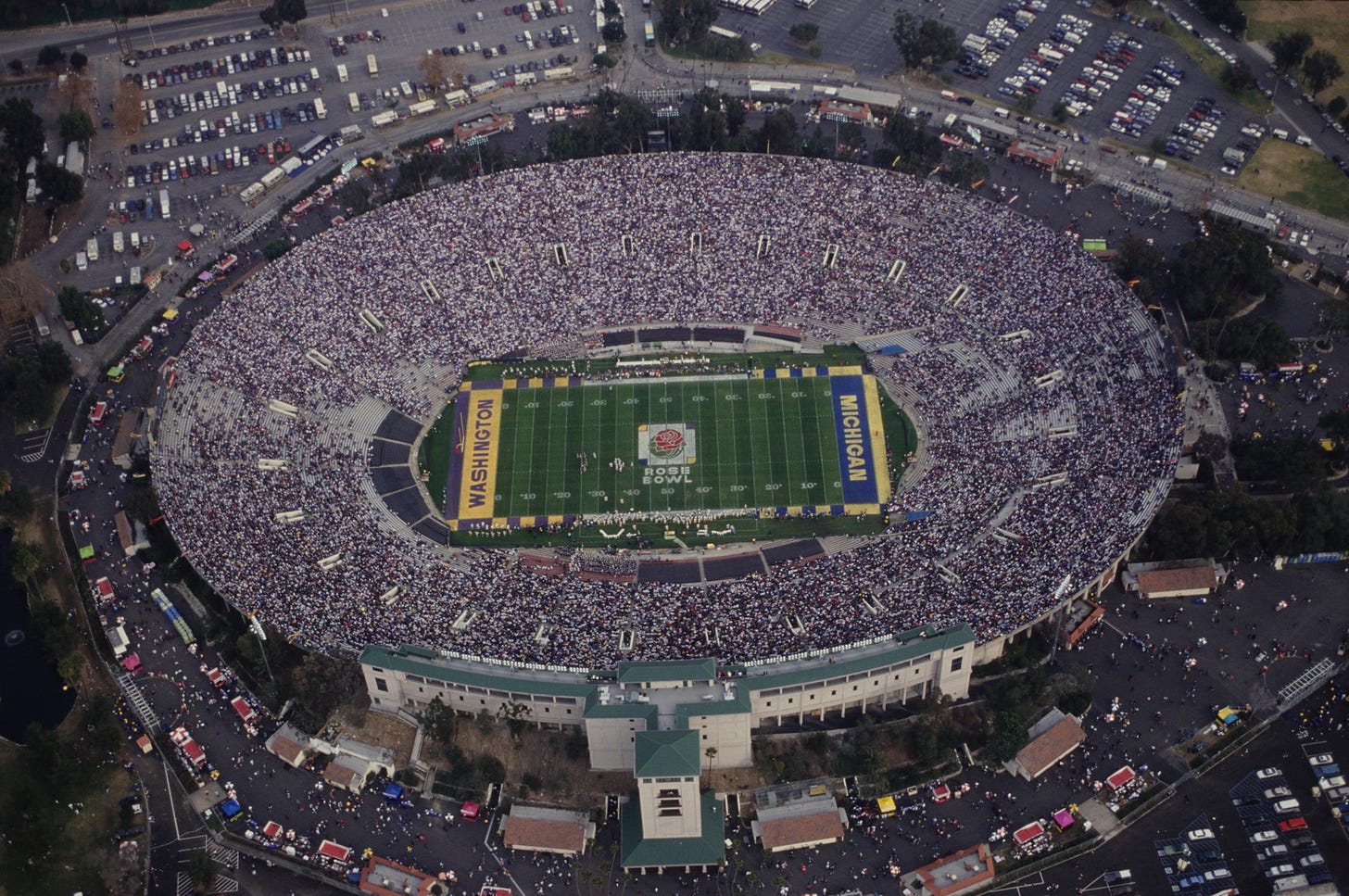Unionize College Sports And Watch the World Bow Down
We're awful slow grabbing one of the best organizing opportunities in America.
“Campus politics” is a phrase and a concept that has always made me roll my eyes. In general, colleges and universities serve as sweet, deadly traps for politically-minded activists. Each year many thousands of young people are politically radicalized on college campuses, but the campuses themselves can also function as isolating sponges that can soak up all of that activism without allowing it to trickle out into the real world, where it would actually matter. The extent to which college students and professors— one of the most leftist demographics in America— focus their political action on colleges themselves is also the extent to which they have been unwittingly marginalized by the forces they oppose.
As I said: in general. An exception to this rule, I think, is labor organizing. In the national political arena, colleges are stereotyped as youthful and elitist backwaters that are easy to ignore—but in the labor arena, colleges are the backbone of an industry, Higher Ed, that is culturally and economically influential and profitable and wracked by the same sorts of inequalities that plague many other industries. Unions in higher ed are just as important as unions anywhere else. If you want to have a political protest you should leave campus. But if you want to form a union, organizing your cohort of grad workers or adjunct professors or dining hall workers is a very worthy use of your time.
Higher Ed has been, for a number of years, the single most active industry in terms of American union drives. New union filings encompassing thousands or even tens of thousands of grad workers and other academic workers have become routine, while filings that large in any other industry are still relatively rare. There is a shallow analysis of this boom in campus organizing that says: These grad students are watering down the REAL labor movement which is factory workers in hard hats, and now unions are a white collar thing, and something about woke kids. This fits nicely with the equally shallow analysis about how the Republican Party is becoming the “party of the working class.” These are both very stupid ideas.
Firstly, union density has been declining for decades, and stands today at 10% overall and 6% in the private sector. Any new union is good. There is no detrimental new union organizing in America, period. If ten million grad student workers want to unionize, fucking god bless them. Organized labor needs all the help it can get. Organized labor is a thirsty man in the desert. We don’t need champagne. We will happily drink piss. Not that campus unions are piss, but you get the point. We are in a survival situation.
Beyond this, there are some specific reasons to be excited about the higher ed union wave. Many or most of the thousands and thousands of young people who join campus unions will go on to get jobs out in the wide world beyond higher ed. They will carry with them the experience of organizing unions and watching unions win things. They will become messengers of union power. They will organize countless new workplaces in the future. This is how it spreads. This is good.
And even more specifically: College sports. Unions of college athletes could become a legitimate source of cultural and political power that could rival that of almost any other group in many sports-crazy states, which are often the same states that have the worst, most right wing politics. This week saw a big step towards making college sports unions a reality. The Dartmouth men’s basketball team voted 13-2 to unionize, making them the first such sports team to do so. (The Northwestern U football team tried this a decade ago, but the NLRB blocked them.) The Biden administration’s NLRB has laid the groundwork for legalizing unions in college sports. The next Republican NLRB is sure to get busy rolling that legal groundwork back. It remains to be seen how durable these unions’ staying power will be in a legal sense. For now, though, it remains true that unions should be busting their ass to organize in college sports while the door is open. It is kind of ridiculous that organizing in that space is still so rare.
There are several factors that make college sports teams an incredibly attractive organizing target. They sit on campuses, which are, as previously mentioned, already hotbeds of union organizing; they are relatively small groups, meaning that they can organize faster; they could wield outsized power if they organized, because they have a huge amount of natural leverage with the schools; and, oh yeah, they are a group of workers who have been getting exploited for generations, because schools and the NCAA make piles of money off of their labor while paying them nothing. Tons of reasons to organize. Athletes could become the ultimate craft unions: Small groups of highly skilled workers who are hard to replace and who can use their irreplaceability to cut themselves into the profits they produce in a major way.
Professional athletes in all of the major American sports leagues are unionized. Financially, the unions have been great for the players. Yet pro sports unions have never been particularly political, nor have they been very plugged into the wider labor movement in the sense of using their own natural leverage to aid other unions and boost new organizing efforts elsewhere and generally channel their own power to the broader working class. In college sports, we have a chance to rectify this. College athletes are young, broke, and ensconced on college campuses. Those things all make them more likely to be politically radicalize-able. (Yes, the culture of sports, as well as the extensive efforts of the NCAA and the schools, will be work against the ability of the players to think like revolutionaries, but a struggle is a struggle.) I do not expect every SEC football team member to turn into Mother Jones. But when you think structurally about the potential of college sports teams to A) unionize relatively quickly and B) to use their unions not only to put money in their own pockets but also to change their campuses, and their states, it becomes clear that there should really be a systematic effort to organize college athletes at a much larger scale than is happening now. That would probably require forming a new union, one that employs organizers who were athletes themselves, who can bridge the cultural gap. But that is a pretty small matter in light of the potential gains for the labor movement. I am a broken record, but the inability of organized labor as it currently exists to see and respond strategically to opportunities like this on a national scale—because there is really no institution in organized labor that views itself as being responsible for seeing and responding to such opportunities—is one of its greatest flaws.
College athletes can be ambassadors for the value of unions; they can be a long-exploited class of workers who finally gets what they deserve; they can be a potent progressive political force in hostile red states; they can be a powerful part of a higher ed union wave that still has a lot of room to run. If Biden is reelected, the NLRB will have time to push to truly solidify the legal status of these unions and set them up for long term stability. The list of priorities for the labor movement is long, I know. But this is one that would pay for itself many times over. The Mercedes auto workers who are trying to organize their plant in Alabama were just forced to sit through a company-sponsored speech by University of Alabama football coach Nick Saban. Imagine how nice it would be to have a union of the University of Alabama football players who could stand up and offer their support to the embattled auto workers. That’s the potential. That’s the way we can build this thing from the ground up. The kids are alright. Let’s plug them into this movement and let them rip.
More
—Previously on this topic: The Mind-Blowing Political Potential of a College Football Players’ Union; Make One Big Higher Ed Union; This Is How It Spreads.
—I have written a book about the labor movement called “The Hammer,” which is available for purchase wherever books are sold. I’ve been out on book tour for several weeks now and it’s going great. Thank you to everyone who came out to the Atlanta event at the Carter Center earlier this week. Here are some upcoming stops on my book tour—come see me and talk about the labor movement!!!
Monday, March 18: Philadelphia, PA—At the Free Library of Philly, 7:30 pm. With Kim Kelly.
Thursday, March 21: New Orleans, LA—At Baldwin and Co. Books, 6 pm. With Sarah Jaffe. Free tickets are here.
Wednesday, March 27: Boston, MA— At the Northeastern College of Professional Studies at 101 Belvidere Street. 6:30 pm. Free tickets are here.
Sunday, April 21: Chicago, IL— “The Hammer” book event and Labor Notes Conference after party at In These Times HQ, 2040 N. Milwaukee Ave. 5 pm.
Additionally, I am almost ready to unveil several California events in April, so stay tuned. If you’re interested in bringing me to your city to speak, email me. Meeting every one of you has been awesome.
—To forge a sustainable career as a writer today as the media industry collapses requires two ingredients: Typing a lot of words, and the support of you, the readers. Thank you, truly, to everyone who subscribes to How Things Work. This is an independent publication that can only exist if people are willing to pay to read it. I don’t have a paywall, but I ask that if you can afford it, you consider becoming a paid subscriber today. It takes two seconds and it’s great for your karma. Rock on, my friends.




Hamilton, it's time for you to glance over and note HELU, Higher Education Labor United, which is pulling together local unions and organizations in higher ed -- not just faculty but also clerical, staff, healthcare workers, everybody -- and will be scooping up college athletes as they unionize. HELU is at higheredlaborunited.org for the vision statement endorsed by 145 plus local unions; founding convention coming up May 17-18-19
speaking as a former college athlete, nothing would bring me more joy than seeing sports teams unionize